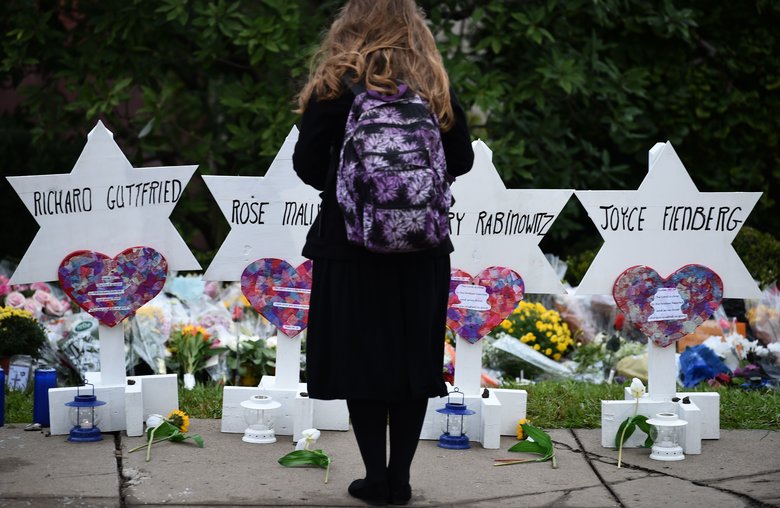
(Brendan Smialowski/AFP/Getty)
Like countless other U.S. citizens, like untold numbers of people around the globe, we are mournful and livid in the wake of the recent murders in Louisville and Pittsburgh. Maurice Stallard, shot while shopping at Kroger with his 12-year-old grandson, and Vickie Lee Jones, shot subsequently in the store’s parking lot, lost their lives to a racist hate crime originally aimed at an African American church. The eleven who died during religious services at Tree of Life Synagogue—Joyce Fienberg, Richard Gottfried, Rose Mallinger, Jerry Rabinowitz, Cecil Rosenthal, David Rosenthal, Bernice Simon, Sylvan Simon, Daniel Stein, Melvin Wax, and Irving Younger—died at the hands of an anti-Semite enraged by imagining an “invasion” of refugees into the U.S., one he blamed in part on the Jews. These two horrific events will be forever linked in our collective memory, for both their close proximity and their origins in malicious white bigotry.
Appallingly, the hatred that destroyed the lives of these thirteen people has been fueled—no attentive observer seriously doubts this—by the very highest levels of our current presidential administration. We are seeing that hatred more and more these days in places like Charlottesville, where neo-Nazis screaming “Jews will not replace us” terrorized a university community and its surrounding town, killing a protester, Heather Heyer, in the process. The intolerance is obviously far older than the current administration and has been growing for some time: The 2015 slaughter of nine African American worshipers during a prayer meeting in Charleston at the hands of a white nationalist happened on President Obama’s watch, as did the 2012 slaying of six Sikh devotees at a temple in Oak Creek, Wisconsin, to name but two recent examples. But it is imperative to note the acceleration of racist fanaticism today, amid a climate in which an elected president with a well-documented work history of racial discrimination regularly mocks those he considers outsiders, a wide-ranging and shifting set of categories that invariably include brown-skinned immigrants and citizens alike. Ignoring these connections is indefensible. Even more, it is nihilistic.
News now comes that President Trump is working to use his executive privilege to end birthright citizenship, the federal right going back to Reconstruction that confers U.S. citizenship on all babies born within our borders, regardless of their parents’ status. Many critics, from both major political parties, believe this is simply a pre-election ploy to fire up the right-wing base with the hope of eliminating so-called “anchor babies” and to motivate Trump supporters to vote for his apparent proxies to win the midterm elections. If so, this is one more instance of despicable race-baiting with the gruesome potential to stir up further hatred, turmoil, and even murder. If Trump genuinely plans to change a long settled, constitutionally guaranteed component of our basic citizenship laws without studying its historical rationale or going through a fully vetted democratic process, the situation is even more grave.
Kellyanne Conway’s intentionally polarizing comment on Monday that the recent carnage at Kroger and Tree of Life has been caused by the “anti-religiosity” of liberal comedians is an attempt to deflect from the truth and delude anyone gullible enough to believe what amounts to reactionary propaganda. The anti-Semitic killer in Pittsburgh had a Gab bio that read “jews are the children of satan. (john 8:44) ——- the lord jesus christ is come in the flesh.” The racist Kroger killer had an animus toward black people; there is no evidence he felt hostility toward Christianity. Conway’s explanation reflects a cynical White House staff desperate to avert attention from the president’s own hateful speech, as well as his starkly observable indifference to the lives lost except as a photo op for political convenience. Like Trump’s public charades of lament, her spin against supposed incivility is utter fiction, part of a larger project of audience manipulation akin to gaslighting. If anyone is desecrating the best of the values professed within the complicated traditions of Judaism, Christianity, Islam, and other religions, it is they.
This is not exaggeration. I speak a lot at colleges and universities, and sometimes at churches as well. Everywhere I go, I hear people sharing their horror at the demagogue in the White House, fury at the lies spewed as carelessly as spit on a ballfield, and devastation at the senseless brutality of our times. Those speaking identify themselves across a broad spectrum; many are Democrats, but plenty more are (or were) loyal Republicans who still long for their party to return to the principles they believe it once upheld. These Trump detractors are not representative of all Americans, by any means; according to the latest polls, the president still holds the support of about 40 percent of the U.S. population. But the opposition is strong, and it appears to be growing. Many of us, it seems, are long beyond weary with the lies intended to pacify us.
Honoring the latest thirteen lives callously stolen by hate, and so many who came before them, requires audible, visible action, even among those made uncomfortable by public protest. A good start would be refusing to accept the lies coming from the highest levels of our government. Standing strong against intolerance is not incivility; it is, and has always been, a bedrock of our democracy.
Marie Griffith is the director of the John C. Danforth Center on Religion and Politics and the editor of Religion & Politics. Her latest book is Moral Combat: How Sex Divided American Christians and Fractured American Politics. Follow her @RMarieGriffith.